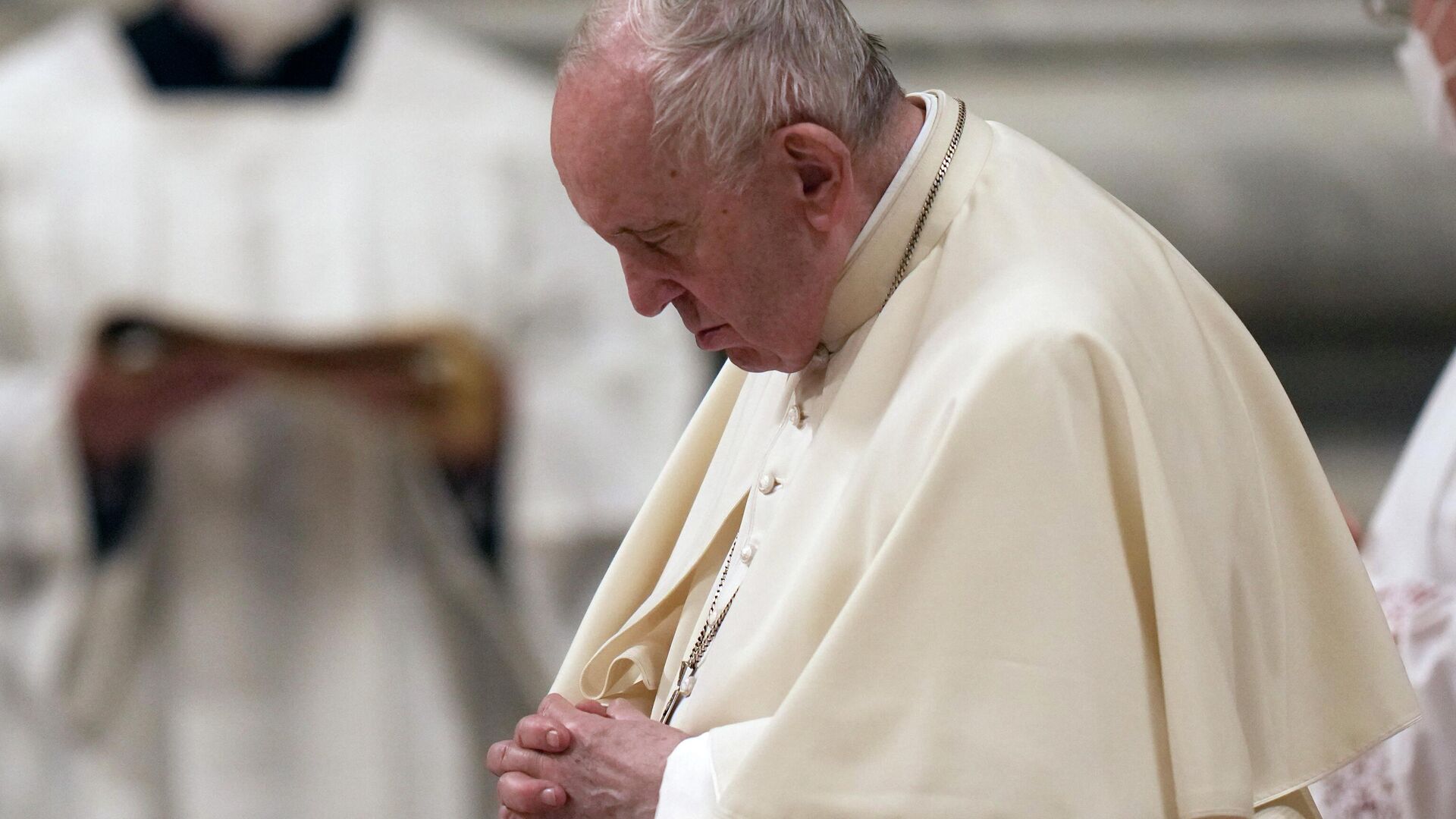https://sputnikglobe.com/20220725/pope-francis-arrives-in-canada-to-apologize-to-indigenous-groups-1097757749.html
Pope Francis Arrives in Canada to Apologize to Indigenous Groups
Pope Francis Arrives in Canada to Apologize to Indigenous Groups
Sputnik International
On Sunday, Pope Francis began his visit to Canada to apologize for the atrocities committed against indigenous persons by the Catholic Church in residential... 25.07.2022, Sputnik International
2022-07-25T05:49+0000
2022-07-25T05:49+0000
2022-08-06T13:36+0000
pope francis
indigenous rights
canada
https://cdn1.img.sputnikglobe.com/img/07e6/04/11/1094828340_0:160:3073:1888_1920x0_80_0_0_10d1d15ddec17e173aa52bb547df4a94.jpg
Pope Francis has flown to Canada to apologize to indigenous people for the atrocities committed by the Catholic Church in Canadian residential schools. An estimated 751 unmarked graves in addition to another 215 unmarked graves were found on the land of a former residential school site in British Columbia and southern Saskatchewan, in the summer of last year. Most of the unmarked graves belonged to children.The Pope was seen and photographed kissing the hand of a residential school survivor when he arrived at the Edmonton International Airport in Alberta. The survivor's name is Elder Alma Desjarlais of the Frog Lake First Nations. Canadian Prime Minister Justin Trudeau and Canada’s first indigenous governor general, Mary Simon, were also present to greet the Pope.Indigenous drums and chanting were played to welcome the Pope, who needed assistance exiting his aircraft due to his strained knees. Gifts were also exchanged between the indigenous leaders and the Pope, who is expected to remain in Canada for a week.The Pope is hoping that his visit is seen as a “penitential pilgrimage” and will be using his time in Canada to atone for the Catholic Church’s abuse and 'cultural erasure' of more than 1,000 indigenous people (mostly children) as well as the trauma suffered by victims, and family members of victims, who survived the schools.The head of the Catholic Church will meet with survivors near the site of a formal residential school on Monday in Maskwacis. The Pope has also planned a prayer and an apology at the cemetery located there.The pope first apologized for the atrocities committed by Catholic missionaries against indigenous children and their families, which started in the 1880s and lasted until 1996. The “reeducation” process forced indigenous children to, sometimes, be forcibly taken from their homes. They were subsequently housed in overcrowded, unsanitary facilities, where they were forbidden from using their language; thus, their culture was effectively erased through Christianization.The Pope first acknowledged th “ideological colonization” that indigenous people in Canada suffered in his apology in April.Indigenous groups are calling for action that stretches beyond apologies, however. Canadian indigenous groups are demanding to be given access to church archives in order to discover the cause of death of the children in the residential schools. They are also calling for indigenous artifacts to be returned from Vatican Museums to their original artists, financial reparations, as well as accountability for the abusers who committed the "genocide-like" crimes, such as nuns who would beat schoolchildren for speaking their native Cree language instead of English, for example.“It shouldn’t be him apologizing,” said Flo Buffalo, a victim of the Indian Residential school for Indigenous children who was beaten and abused by Catholic nuns, in reference to the Pope's visit. “It should be them.”
canada
Sputnik International
feedback@sputniknews.com
+74956456601
MIA „Rosiya Segodnya“
2022
Mary Manley
https://cdn1.img.sputnikglobe.com/img/07e6/01/0b/1092187887_0:0:2048:2049_100x100_80_0_0_0c2cc4c84f89aff034cc55bb01fb6697.jpg
Mary Manley
https://cdn1.img.sputnikglobe.com/img/07e6/01/0b/1092187887_0:0:2048:2049_100x100_80_0_0_0c2cc4c84f89aff034cc55bb01fb6697.jpg
News
en_EN
Sputnik International
feedback@sputniknews.com
+74956456601
MIA „Rosiya Segodnya“
Sputnik International
feedback@sputniknews.com
+74956456601
MIA „Rosiya Segodnya“
Mary Manley
https://cdn1.img.sputnikglobe.com/img/07e6/01/0b/1092187887_0:0:2048:2049_100x100_80_0_0_0c2cc4c84f89aff034cc55bb01fb6697.jpg
pope francis, indigenous rights, canada
pope francis, indigenous rights, canada
Pope Francis Arrives in Canada to Apologize to Indigenous Groups
05:49 GMT 25.07.2022 (Updated: 13:36 GMT 06.08.2022) On Sunday, Pope Francis began his visit to Canada to apologize for the atrocities committed against indigenous persons by the Catholic Church in residential schools that resulted in over 1,000 unmarked graves that were discovered last year. The visit to Canada comes after the Pope made his first apology to survivors and relatives in April.
Pope Francis has flown to Canada to apologize to indigenous people for the atrocities committed by the Catholic Church in Canadian residential schools. An estimated 751 unmarked graves in addition to another 215 unmarked graves were found on the land of a former residential school site in British Columbia and southern Saskatchewan, in the summer of last year. Most of the unmarked graves belonged to children. The Pope was seen and photographed kissing the hand of a residential school survivor when he arrived at the
Edmonton International Airport in Alberta. The survivor's name is Elder Alma Desjarlais of the Frog Lake First Nations. Canadian Prime Minister Justin Trudeau and Canada’s first indigenous governor general, Mary Simon, were also present to greet the Pope.
Indigenous drums and chanting were played to welcome the Pope, who needed assistance exiting his aircraft due to his strained knees. Gifts were also exchanged between the indigenous leaders and the Pope, who is expected to remain in Canada for a week.
The Pope is hoping that his visit is seen as a “penitential pilgrimage” and will be using his time in Canada to atone for the Catholic Church’s abuse and 'cultural erasure' of more than 1,000 indigenous people (mostly children) as well as the trauma suffered by victims, and family members of victims, who survived the schools.
The head of the Catholic Church will meet with survivors near the site of a formal residential school on Monday in Maskwacis. The Pope has also planned a prayer and an apology at the cemetery located there.
“Right now, many of our people are skeptical and they are hurt,” said Grand Chief George Arcand Junior of the Confederacy of Treaty Six First Nations, who greeted the Pope. “We could begin our journey of healing... and change the way things have been for our people for many, many years,” he added in reference to the Pope’s long-awaited apology.
The pope first apologized for the atrocities committed by Catholic missionaries against indigenous children and their families, which started in the 1880s and lasted until 1996. The “reeducation” process forced indigenous children to, sometimes, be forcibly taken from their homes. They were subsequently housed in overcrowded, unsanitary facilities, where they were forbidden from using their language; thus, their culture was effectively erased through Christianization.
The Pope first acknowledged th “ideological colonization” that indigenous people in
Canada suffered in his apology in April.
“For the deplorable conduct of those members of the Catholic Church, I ask for God's forgiveness and I want to say to you with all my heart: I am very sorry. And I join my brothers, the Canadian bishops, in asking your pardon,” the pope said in April.
Indigenous groups are calling for action that stretches beyond apologies, however. Canadian indigenous groups are demanding to be given access to church archives in order to discover the cause of death of the children in the residential schools. They are also calling for indigenous artifacts to be returned from Vatican Museums to their original artists, financial reparations, as well as accountability for the abusers who committed the "genocide-like" crimes, such as nuns who would beat schoolchildren for speaking their native Cree language instead of English, for example.
“It shouldn’t be him apologizing,” said Flo Buffalo, a victim of the Indian Residential school for Indigenous children who was beaten and abused by Catholic nuns, in reference to the Pope's visit. “It should be them.”




